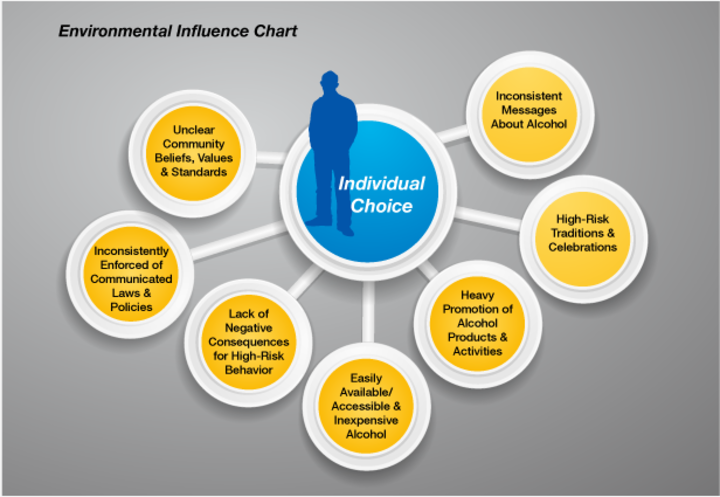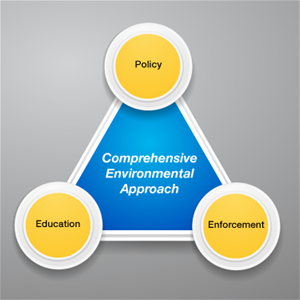ECOLOGICAL MODEL OF HEALTH
The NECPA believes that comprehensive environmental approaches are the most effective way for colleges to reduce alcohol use and alcohol related problems. Multiple levels of prevention are applied across the campus and the community to change individual and community norms and behaviors. The Comprehensive Environmental Prevention Approach is based on the ecological model of health. This model suggests that there is a direct relationship between an individual’s environment and his or her attitudes, behaviors, and health practices.

CAMPUS-COMMUNITY COALITION
A comprehensive approach works across all aspects of the entire campus-community, and works at every population level:
- individual
- group
- campus
- community
What makes the approach comprehensive is that multiple levels of prevention strategy are applied across the campus-community. These include:
- Alcohol education for the individual students and groups who violate campus/community alcohol policies
- Intervention and treatment for individual students who show signs of pre-dependency
- Group-specific education and intervention for specific high-risk populations
- Campus-wide policies that discourage high-risk drinking for all students
- Campus-wide programs that support low-risk drinking or abstinence for all students
- Community-wide policies that discourage high-risk drinking for all citizens
- Community-wide policies that encourage low-risk drinking or abstinence for all citizens
Effective alcohol prevention efforts are comprehensive and address both individual and environmental variables that contribute to the problem. These efforts include prevention, early intervention and treatment. Effective college programs include multiple programs, policies, activities and interventions that address all factors that contribute to high-risk drinking among students. Research has shown that when used in isolation, educational approaches have limited effectiveness; in order to be successful colleges must also make changes in the campus community environment and address individual-focused interventions for high-risk drinkers. The National Institute on Alcohol Abuse and Alcoholism (NIAAA) developed the College Alcohol Intervention Matrix (CollegeAIM) guide and website to help college personnel choose wisely among the many potential interventions to address harmful and underage college drinking.
BUILDING YOUR COALITION
There are many steps to building a successful coalition. To help, please see 'Building Your Coalition' that can be downloaded here.
STRATEGIES TO CHANGE THE ENVIRONMENT

Changing identified aspects of the environment requires a set of three simultaneous strategies:
Policy
Policy reflects the community’s standards of behavior and its aspirations for it's members. Policy includes a community’s:
- Rules
- Regulations
- Laws
- Ordinances
- Customs/Traditions
Education
Education includes all the ways a community teaches it’s members about: the community’s standards, why they are important and what will happen if they are violated.
Education about the community’s alcohol standards might focus on college students, owner and servers a licensed drinking establishments, parents, lawmakers and tourists, and event-goers to the campus and community.
Enforcement
Enforcement gives meaning and seriousness to policy and education. This side of the triangle includes enforcement of the community’s laws. It also includes social consequences for violating the community’s non-written customs and traditions
DOES THIS APPROACH WORK?
Learn more about how this approach works. The NU Directions 5 Year Report can be downloaded here.
JOINING THE NECPA WILL HELP YOUR CAMPUS.
Standard Membership Benefits:
- Opportunities to meet with campus alcohol task force members from other institutions of higher education.
- Technical assistance at all steps of the program development process, from initial needs assessment to program evaluation.
- An online College Behavior Profile (CBP) and/or Year One College Behavior Profile (Y1CBP) customized for each campus.
- Travel support to attend state, regional and national training opportunities.
- Mini-grant funds for high-risk drinking prevention programs on each campus.
- Opportunities to join local prevention coalitions and apply for state and federal substance abuse prevention grants.
- Access to the Power of Parenting website for outreach to parents of incoming students at Nebraska institutions of higher education
To learn more about the NECPA or how to join, please fill out our contact form.